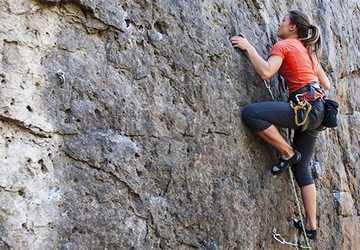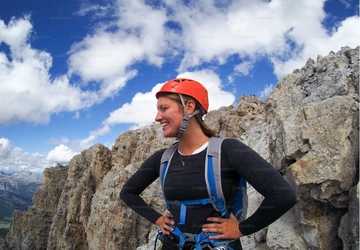Embarking on the Adventure
Rock climbing isn't just a sport; it's a lifelong journey of pushing your physical and mental limits. When you start, you are more or less a blank slate, but as you continue, you find that mastering rock climbing becomes a goal that's increasingly within reach. To get there, you'll need more than a sturdy rope and a pair of climbing shoes. In this guide, we will dive deep into various aspects to turn you from a novice into an expert climber.
Fundamental Elements You Should Know
● Gear Up Right: The right gear is like an extended part of your body when climbing. Make sure you invest in quality equipment because your safety depends on it. Research before buying and consult experienced climbers if possible.
● Understand Climbing Grades: Climbing grades can be perplexing when you're a beginner. These are basically numerical indicators of a climb's difficulty. Knowing the grading system will help you assess whether a climb is within your skill set.
Building Blocks of Rock Climbing

● Physical Conditioning: Rock climbing is a physically demanding activity. Regular workouts focusing on strength and endurance can be a huge asset. Cardio exercises like running can enhance your stamina while weight training can provide the muscle power you need for climbing.
● Mental Preparedness: A sharp mind is equally crucial when it comes to rock climbing skills. Visualization techniques can be helpful. Before you climb, visualize your moves, the holds, and how you'll navigate through difficult sections.
● Grip Styles: Learning the different grip styles like the crimp, pinch, and sloper can go a long way. Mastering these can be a game-changer in your climbing experience.
● Footwork: Skilled footwork is another aspect that will propel you from being an amateur to an adept climber. The goal is to use your feet to bear most of your body weight, thus conserving arm strength.
The Great Outdoors: Safety and Survival
Outdoor climbing techniques are slightly different from indoor ones. The unpredictability of natural terrains adds an extra layer of complexity. Safety measures like double-checking your knots, wearing a helmet, and never climbing alone can be lifesaving.
● Preparing for Wilderness: If you're scaling a remote cliff, having some wilderness cooking techniques under your belt can be quite useful. Knowing how to prepare simple, high-energy meals can make your outdoor adventure more fulfilling.
Continuous Learning and Adaptability
Rock climbing is a sport where you're always learning. From new climbing styles to advanced belay techniques, the learning curve is a constant. Hence, being adaptable is the key to mastering rock climbing.
Document Your Progress
Keeping a climbing journal can be beneficial. Document your climbs, the difficulties you faced, and how you overcame them. It can serve as a valuable resource to trace your progress.
Learn from Others
Networking with other climbers and sharing experiences can be very enriching. Sometimes a single tip from a seasoned climber can dramatically improve your rock climbing skills.
The Significance of Rest and Recovery
When pushing your limits in any athletic endeavor, it's important to also consider rest and recovery as part of your regimen. Overworking yourself can lead to injuries and burnout, which will set back your goal of mastering rock climbing.
Quality sleep isn't just good for general health; it's essential for muscle recovery and mental clarity. An inadequate amount of rest can seriously impede your performance and attention to safety measures, which are vital in rock climbing.
Active recovery refers to engaging in low-intensity activities on your rest days. Think of activities like swimming or going for a brisk walk. These activities help in muscle recovery and prepare your body for the next challenging climb.
Route-reading is the ability to examine a climbing route from the ground and plan your movements. Proficiency in route-reading will significantly contribute to improving your rock climbing skills.

Before you start climbing, take a moment to analyze the route. Identify key holds and difficult sections. Visualization is crucial here; imagine yourself going through the movements, grips, and stances you'll use.
Even the best-laid plans may require adjustments. If you find yourself in a difficult position, don't panic. Take a deep breath and reassess your situation. Your ability to adapt is a vital outdoor climbing technique that will help you navigate unexpected challenges.
Climbing Ethics and Outdoor Stewardship
As more people take up climbing, it's imperative to follow ethical guidelines to maintain the integrity of natural climbing environments.
The Leave No Trace principle is not just about picking up after yourself; it extends to respecting wildlife, minimizing your impact, and maintaining the natural state of the wilderness.
Etiquette is important in crowded climbing areas. Don't hog routes, respect the queue, and be mindful of other climbers. These simple actions create a better climbing experience for everyone.
If you're planning on an extended trip, mastering some wilderness cooking techniques can be quite beneficial. Consuming the right kind of nutrients is crucial for sustained energy and recovery.
Foods high in carbohydrates and proteins can fuel your climb and speed up recovery. Snacks like trail mix or energy bars can be quite handy when you need an immediate boost.
Rock climbing is an adventure that demands a blend of physical prowess, mental grit, and technical knowledge. The road to becoming a proficient climber is long and requires continuous effort. But the rewards, both physical and mental, are immeasurable. By focusing on your fitness, technique, safety, and respect for the natural world, you are well on your way to mastering rock climbing.
As you embark on this journey, remember that mastering the sport is not an overnight feat. It's an ongoing process of learning, practicing, and improving. Keep pushing your limits and honing your outdoor climbing techniques. Before you know it, you'll find yourself scaling heights you never thought possible. Happy climbing!